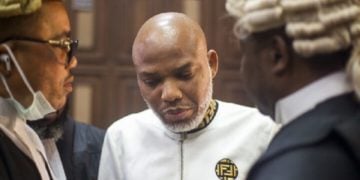The Nigerian Armed Forces have banned military personnel from marrying foreigners and naturalised Nigerians.
According to the Harmonised Terms and Conditions of Service (HTACOS) of the Armed Forces Act 2024, it is also illegal for commissioned officers to marry non-commissioned officers, such as soldiers, ratings, or airwomen.
Service chiefs are under strict orders to implement the new rules.
It reads in part: “This Harmonised Terms and Conditions of Service Officers 2024 has been promulgated to ensure uniform implementation and it supersedes the previous HTACOS Officers 2017.
The contents are to be strictly observed on all occasions and interpreted reasonably and intelligently, with due respect to the interest of the Services, bearing in mind that no attempt has been made to provide for unnecessary and self-evident exceptions. This HTACOS is subject to review after five years.”
Chapter 25 of the new rule deals with marriages for the officers and soldiers of the Armed Forces.
Specifically, Subsection 5 of the document states that “no officer is allowed to marry a foreigner or a naturalised Nigerian.”
The HTACOS document is subject to review after five years.
The 2024 edition of the HTACOS, as approved by the Armed Forces Council, came into effect on December 6, 2024, when it was signed by the President.
According to Chapter 25, Subsection 1, a second lieutenant, midshipman and pilot officer (2Lt/Mid/Plt Offr) is on probation and is expected to live in the Officers’ Mess without a spouse.
Also, he is not allowed to marry, and if he has been married before he went to the Academy, though his records may show this fact, he will not be recognised as a married officer for the purpose of accommodation, pay and other allowances applicable to married officers.
However, Subsection 2 of the same chapter states that “where a soldier/rating/airman is commissioned into any of the Services’ Corps/Branch/Specialty from the ranks as 2Lt/Mid/Plt Officer and the officer was married before commissioning, he will live in the Officers’ Mess for a minimum of three months. Thereafter, he may be given married accommodation if available or lodging allowance in lieu.”
According to the law, before marriage, officers are required to obtain approval from higher authorities and subject their partners to a vetting process.
Chapter 25, Subsection 3-4 states: “Any officer who is not yet married must first seek approval of the appropriate superior authority of his/her intention to marry. An RCC officer shall not be eligible to apply to marry until after five years of commissioning.
The approval shall be granted only after vetting and clearance of the officer’s proposed spouse by the appropriate superior authority.”
“If an officer marries a soldier/rating/airman/airwoman under any of the existing ordinances, the officer or the soldier/rating/airman/airwoman will be given the option to leave the Service from the date of such marriage. Where personnel married to fellow personnel are commissioned, the spouse of the commissioned officer shall be discharged from Service. It is an offence for an officer to conceal his marriage to a soldier/rating/airman/airwoman for the purpose of preventing the officer or the soldier/rating/airman/airwoman from leaving the Service.”
Why It Is So – Ex-General
Meanwhile, a retired major general, who spoke on condition of anonymity, said the rule was intended to prevent soldiers from divulging information to foreign countries through their spouses.
He said there was no way an officer would not, on occasion, discuss job-related issues with their spouse, adding that doing so with a foreign partner could jeopardise the sovereignty of the officer’s country.
He said, “Obviously, the rule is meant for the protection of information and other security-related issues. Imagine a Nigerian soldier married to a Cameroonian or Liberian, and Nigeria goes into war with any of those countries, the general belief is that loyalty could be divided or something like that. If it is generally allowed, it won’t be in the interest of the nation, security-wise.”
Law Should Be Reviewed, Says Retired Group Captain
Group Captain Shehu Sadeeq (Rtd) said that while the condition was rooted in national security, such a clause should be reviewed in line with best practices in advanced countries where vetting is carried out on the intended spouse. He said many militaries across the globe maintain similar laws but do not outright ban them.
He explained that the HTCOS (Harmonised Terms and Conditions of Service) is a document that the military designed itself to regulate how affairs within the military can be conducted, and is different from the Armed Forces Act.
According to him, the outright ban on foreign spouses is meant to prevent a potential security compromise because officers have access to classified information. He added that the provision is rooted in national security considerations and not cultural prejudice. He said marriage to a foreigner could unintentionally create a channel for intelligence leakage.
Secondly, he said the ban relates to citizenship and allegiance, adding that “a spouse’s foreign citizenship can raise questions about dual allegiance, like inheritance rights and residence privileges, in ways that might conflict with Nigeria’s security laws”.
The third reason, according to him, is operational deployment and posting risks. He said officers married to foreigners could face restrictions when posted abroad, particularly when occupying sensitive commands, maybe in intelligence, which complicates personnel management. The final reason he advanced is reciprocity and diplomatic reasons.
According to Shehu, many militaries across the globe maintain similar laws. He explained, however, that it was not universal but also not unique to Nigeria.
“For example, in the United States, there is no general bar, but officers in certain agencies require security clearance to marry a foreigner. While it is not prohibited completely, vetting of the intended spouse is required.
“In the UK, they do not ban marriage to foreign spouses, but the officer’s access to classified information is restricted until vetting is carried out on the spouse. China, Russia, and several Middle Eastern and African states explicitly prohibit it. India and Pakistan also require approval before marriage,” he said.
“Maybe, looking at what is happening in other parts of the world, I think we can review this law to introduce instruments of vetting before such a marriage is done instead of an outright ban. This rule was enacted during the military regime; the younger generation of officers may consider such conditions an infringement on their rights. I think it is one area that the military might look at, seeing what is happening in other countries,” he added.
However, the rule is not observed in a country like the United States of America, where military officers are generally allowed to marry foreigners.
Online checks reveal that in the US military, officers are permitted to marry foreign nationals, but such officers must obtain a security clearance.
They are expected to report the relationship, and the marriage is considered in security clearance decisions.
Reacting to the Nigerian rule on marriage to foreigners by its military men, the Executive Director, Resource Centre for Human Rights and Civic Education, Dr Zikirullahi Ibrahim, faulted the regulation.
He said such a law should apply only to those in positions of authority, such as the Service Chiefs who have access to sensitive information, and not to just anyone in the military.
He said, “When you say members of the Armed Forces should not marry a foreigner, why are they isolated from other government officials? I ask, what about Nigerians in the Armed Forces who have relocated their families abroad?
These families most times later naturalise in foreign lands. We have seen a number of them. Most of our top military brass, their families have dual citizenship, and so what are we doing about that?”
He further queried why such a law does not apply to the political class.
“What about the politicians? Many of them have dual citizenship. Why do we have to isolate the military; are they not citizens of this country? If we are to talk about sanitising the system, there is no arm of government that should be isolated. You don’t make laws for a particular set of people and another law for a different set of people.
There should be consistency in terms of policymaking so that, at the end of the day, you cannot make laws that cannot be implemented, that won’t be effective.”
He reiterated that only those aspiring to occupy positions of authority should be so restricted.
He said that only those considered for appointments as chiefs in any of the Services should be banned from having a foreign spouse.
He said love and affection shouldn’t be subject to human laws.
“A love relationship is an act of God. We can have a blanket law that says certain positions cannot be occupied by persons with dual citizenship, children or spouse. This would make people more conscious and imbibe a sense of nationality knowing that ‘if I’ve this, I’ll be limited in my career progression.’”
But the executive director of the Civil Society Legislative Advocacy Centre (CISLAC), Auwal Rafsanjani, supported the restriction of marriage for serving military officers.
According to him, such persons hold the nation’s information and should consider national interest in their choice of spouse.
He said, “In my opinion, if you’re holding a sensitive security position, it will definitely be risky to get married or maintain a relationship with someone from another nationality who will probably leak such information.
“So if you decide to be a security person, then you already know the consequences. I don’t think such individuals should be allowed to maintain a relationship that exposes our sensitive information.
“If you decide to be security personnel, even before you join, you already know the sacrifices and privileges involved, so, for me, right from the beginning, people should be aware of those things. They already know certain things that must remain confidential for the sake of the nation.”





